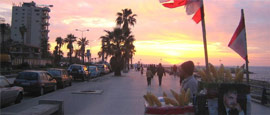Getting around Beirut
Beirut's public transport system is chaotic at best. Private companies operate buses within the city. One of the main operators is the LCC (tel: +961 5 810 510; www.lccworld.com), which has a fleet of red and white buses. There are no stops; to get onto a bus you must stand at the side of the road and signal with your hand as the bus approaches. Beirut has no metro or trams.
You can also use a service taxi (a shared taxi) or regular taxi in Beirut. Be sure to tell your driver where you're headed before you enter the car, otherwise you will be charged extra. Most locals book taxis in advance by calling Allo Taxi (tel: 1213, in Lebanon only) or Charlie Taxi (tel: 1514, in Lebanon only).
Driving in Beirut, as in the rest of Lebanon is a fairly hazardous experience, thanks to the speed-loving local drivers and potholed roads. You can bring your own car, but a steep charge (levied in cash) is payable on entering the country, although you should have it returned on leaving. Hire cars are available but the quality varies and they can be expensive. There are no regular tolls, barring the inventions of local police, and no set-in-stone parking regulations.
Most international car hire companies have offices in Beirut. Sixt (tel: +961 1 707 505; www.sixt.com.lb) and Avis (tel: +961 1 366 662; www.avis.com.lb) have numerous offices throughout Beirut. For a local company, call Beirut Call Rental (tel: +961 1 740 741; www.beirutrentacar.com). You generally have to be at least 23 and have been the holder of a driving licence for at least two years to hire a car in Beirut. You will also need an International Driving Permit.
Beirut by Bike, New Waterfront (tel: +961 1 365 524; www.facebook.com/beirutbybike, is the main bike hire service. Bikes are available to rent by the hour. It’s worth bearing in mind that Beirut’s traffic can be dangerous, so be careful. There are no designated cycle paths.
Do you have any Feedback about this page?
© 2026 Columbus Travel Media Ltd. All rights reserved. No part of this site may be reproduced without our written permission, click here for information on Columbus Content Solutions.




 You know where
You know where